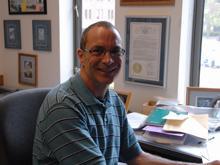Keith Hyatt, Ed.D.
Professor Emeritus
About
Education
BS Marketing Education, & MS Special Education, University of Idaho;
EdS Special Education - School Psychology, & EdD Special Education, University of Nevada-Las Vegas
Higher Education
I am fortunate to work at WWU with excellent faculty in the Department of Special Education and Education Leadership. In addition, the students with whom we work are highly motivated and become some of the best teachers in Washington State and the nation.
My professional interests include disability law, inclusion, the IEP, and evidence-based vs. pseudoscientific practice.
Disability is natural part of the human condition and an aspect of diversity that is frequently overlooked. High quality instruction in inclusive settings can significantly and positively impact the lives of individuals with disabilities and foster social justice. The law and IEP are two avenues that can support inclusive practices.
My interest in identifying pseudoscientific practice is related to the fact that all of us are susceptible to scams and fraudulent or pseudoscientific practice. Students with disabilities, in particular, have little time to waste on pseudoscientific practices that fail to provide meaningful educational outcomes and may even be dangerous. So, people new to the field should be aware of past fads in order to minimize the chance of falling for current or future fads.
Some of my favorite publications.
Hyatt, K. J., & Filler, J. W. (2016). Developing Meaningful IEPs: The Complete Guide to Educationally Meaningful Individualized Educational Programs for Students with Disabilities. Dubuque, IA: Kendall Hunt Publishing Company.
Hyatt, K. J., & Filler, J. (2011). LRE reexamined: Misinterpretations and unintended consequences. International Journal of Inclusive Education, 15. 1031-1045. DOI: 10.1080/13603116.2010.484509
Hyatt, K. J., Stephenson, J., & Carter, M. (2009). A review of three controversial practices: Perceptual motor programs, sensory integration, and tinted lenses. Education and Treatment of Children, 32, 313-342.
Hyatt, K. J. (2007). Brain Gym®: Building stronger brains or wishful thinking. Remedial and Special Education, 28, 117-124.
Slentz, K., & Hyatt, K. J. (2008). Curriculum-based assessment: Considerations and applications in early childhood. Best Practices in School Psychology. Bethesda, MD: National Association of School Psychologists.
Public School Experience
I have had multiple positions in the P-12 system and enjoyed each one. These included the following:
- Teacher in a GED program for migrant/seasonal farm workers
- Special Education Teacher (elementary, middle school, and high school)
- School Psychologist
- Behavior Interventionist
- Elementary School Principal



